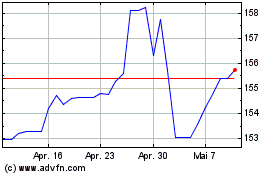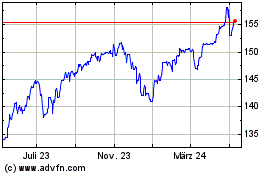Bank Of England MPC Split Deepens Amid High Inflation
15 Juni 2017 - 10:45AM
RTTF2
The Bank of England decided to leave its record low interest
rate unchanged on Thursday, but the split among policymakers
widened as more members sought a hike, citing the rising
inflation.
The Monetary Policy Committee, headed by Governor Mark Carney,
voted 5-3 to hold the interest rate at a record low of 0.25
percent. However, all eight members voted to maintain the
quantitative easing at GBP 435 billion.
Along with Kristin Forbes, Ian McCafferty and Michael Saunders
also sought a 25 basis point increase in interest rate in the
latest session. Forbes is set to step down from the rate-setting
body and will not be present at the next session on August 3.
For these members, the outlook justified an immediate increase
in Bank Rate. Further, they also pointed out that the slack in the
labor market appeared to have diminished.
Nonetheless, all members agreed that any increases in Bank Rate
would be expected to be at a gradual pace and to a limited
extent.
The withdrawal of part of the stimulus that had been injected in
August last year would help to moderate inflation overshoot, while
leaving monetary policy very supportive, members arguing for
tightening said.
Inflation has accelerated to a near four-year high of 2.9
percent in May. Members noted that inflation could overshoot the
target by somewhat more than previously suggested.
Most of the members said a slowdown in household consumption,
and GDP as a whole, had recently begun, and it was too early to
judge how large and persistent it would prove to be.
A period of slower than expected growth could see a margin of
the slack re-opening, the minutes showed.
This was the first policy meeting after Prime Minister Theresa
May lost the Conservative parliamentary majority at the June 8
general election. The inconclusive election has raised the
uncertainty over the policy as well as Brexit.
Moreover, ongoing political uncertainty is consuming precious
negotiating time with the European Union.
With the economy having weathered political uncertainty
relatively well in the recent past, and signs emerging that the
Government may be about to ease back on austerity, today's
statement supports the view that the first hike in rates will come
much sooner than the April 2020 date implied by markets ahead of
today's meeting, Paul Hollingsworth, an economist at Capital
Economics, said.
US Dollar vs Yen (FX:USDJPY)
Forex Chart
Von Mär 2024 bis Apr 2024

US Dollar vs Yen (FX:USDJPY)
Forex Chart
Von Apr 2023 bis Apr 2024
